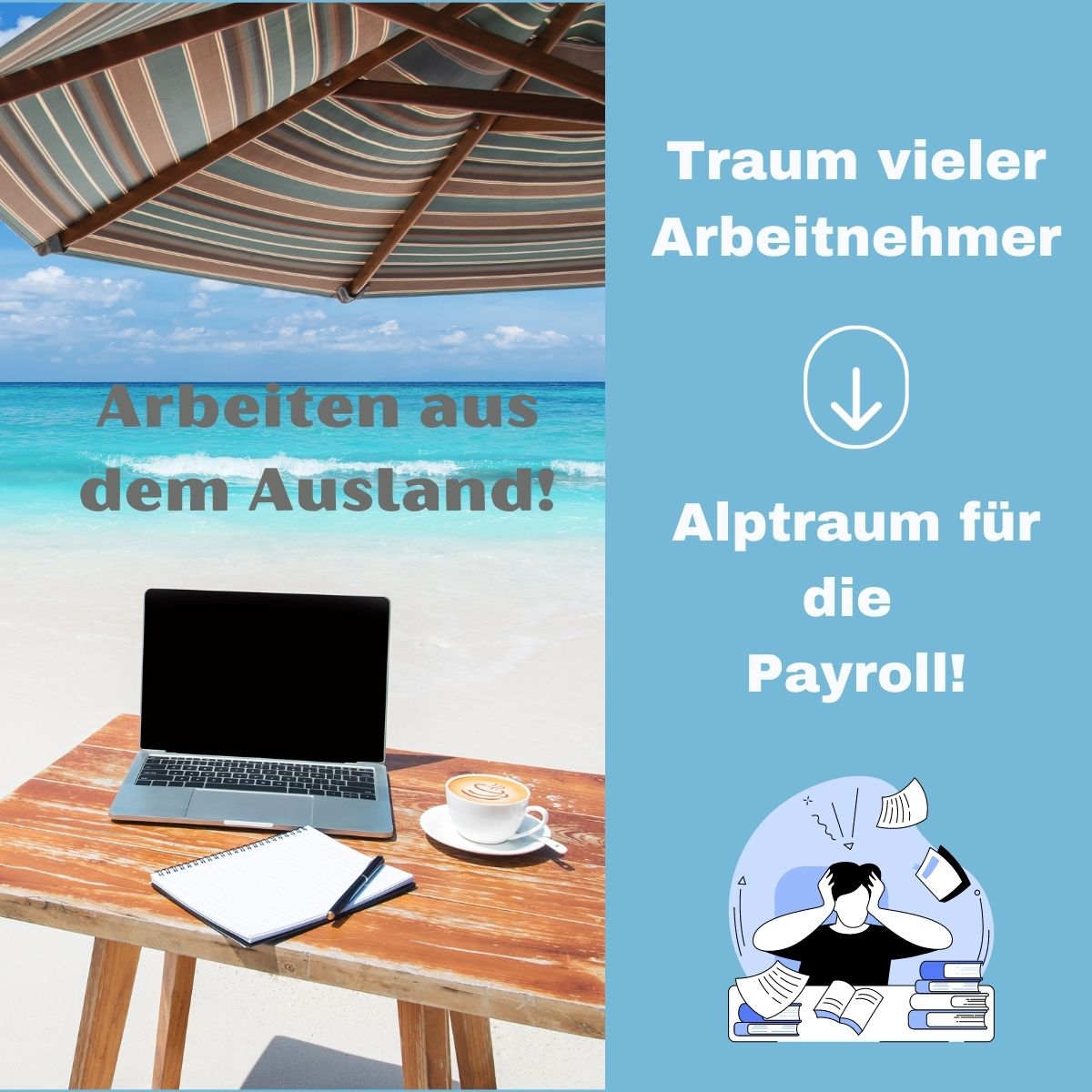The pandemic has shown – mobile working works and offers employees, but also companies, many opportunities.
I am an absolute fan of remote working, even from anywhere! And ‘anywhere’ is now not only the change between working in the office, home office, a cafe, but also the possibility to work longer or shorter from abroad. The desire of many employees to work mobile from abroad is increasing.
Working on the road from abroad – great for employees, but unfortunately not for payroll!
But I am also a payroll accountant and unfortunately I have to raise my (payroll) finger again and point out various difficulties of flexible working from abroad. Because I know how much extra work this issue means for the Payroller.
Generally speaking, no one-fits-all solutions are applicable to foreign payroll issues. Each employee case must be examined individually. This costs a lot of time and resources. These are also no longer available in unlimited quantities due to the shortage of specialists in payroll accounting. I estimate the time expenditure in relation to a normal employee at approx. 1:10. If it is enough.
The following facts and changes must be checked both in advance of working abroad and on a monthly basis:
1. check of the wage tax liability – the tax office travels with you
According to tax law, a taxpayer is liable to pay tax where he has his residence or habitual abode (center of life). Depending on the country and the duration of the foreign activity, the individual double taxation agreements or foreign activity decrees must be checked here.
a) Does the sending country (foreign country) have the right of taxation due to the duration of the stay abroad (usually more than 183 days)?
b) Must wages be divided? This means partial taxation in Germany and abroad. Calculation of the salary to be split. For the taxation of the foreign wage, you need an accounting office abroad. If one does not already exist, one must be found and the payroll must be completely set up with the service provider from scratch.
c) Do wages in Germany have to be exempted from taxation (e.g. foreign activity decree)?
d) What documentation/reporting obligations must be carried out, etc.?
And not to forget: Check: Does a home office from abroad lead to a permanent establishment for wage tax purposes? – more about this here.
2. check of the social security obligation – where do social security contributions have to be paid?
The place of employment principle applies to social insurance. As an employee or self-employed person, I am liable for social insurance contributions at the place where I work. The social insurance does not make a difference whether one travels and works abroad for a longer period or only for a short period (business trip). Every day is a so-called posting under social insurance law. For postings in the EU/EEA area, an exception to the place of employment principle applies for 2 years. The employee can continue to be subject to social insurance in the country of residence. However, the issuance of an A1 certificate as proof to avoid double contribution is mandatory here.
For travel to third countries, e.g. the USA, the situation becomes more difficult again because, for example, not all branches of social insurance are covered. Here, the existing social security agreements must be checked and, if necessary, solutions must be found with the traveling employee.
Furthermore, there are also countries without social security agreements, e.g. Hong Kong. Here there is no regulation at all. Is it necessary to take out an additional health insurance? What is the liability and regulation of cost absorption?
3. accident insurance – What happens in case of an accident at work abroad? Sufficient protection?
To a certain extent, the employers’ liability insurance also covers accidents at work that occur abroad. But usually only for a limited time. What is the demarcation between an accident at work and a private accident? (here there are already numerous judgments, where the BG excludes the assumption of costs). Should additional accident insurance be taken out? Who bears the additional costs – the employer or the employee?
More information is available from the VBG.
4. Additional reporting obligations must be created and checked
In addition to the normal reporting obligations in tax and social insurance, various countries would like to have additional reports. This must be checked and the reports created if necessary.
Examples would be the ZKO3 form for Austria or the reports via SIPSI for France. Non-compliance may result in severe fines.
5. Minimum Wage – Examination of the Minimum Wage Regulations in the Individual Countries
Even though Germany now has a very high minimum wage, minimum wage regulations and reporting requirements must be checked and fines avoided if necessary.
In a nutshell: working from abroad is super, flexible and modern. But despite all the euphoria, the additional work for payroll accounting and the liability risk by decision-makers should not be forgotten. Examination with external experts in the apron, can avoid bad surprises. Also general regulations (Company agreements) for employees, who would like to work from abroad, help to reduce expenditure. And now have fun traveling – but don’t forget the payroll accountants!




